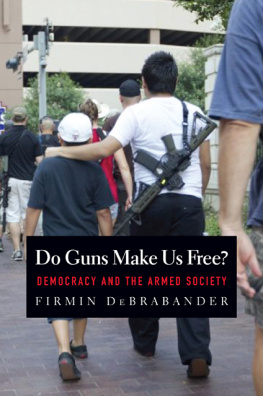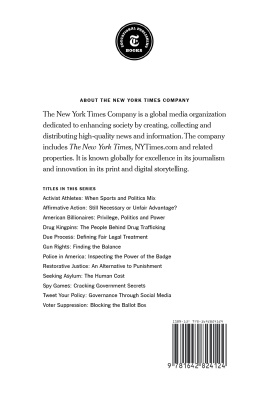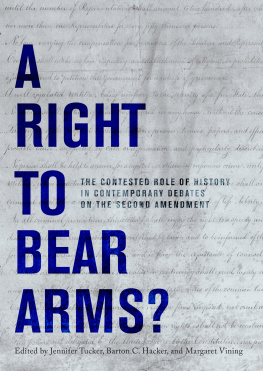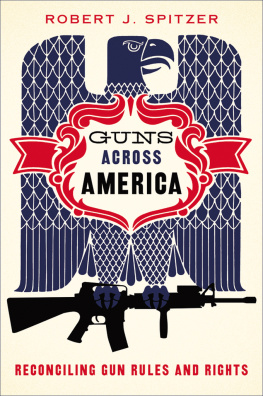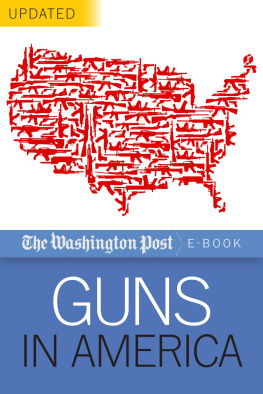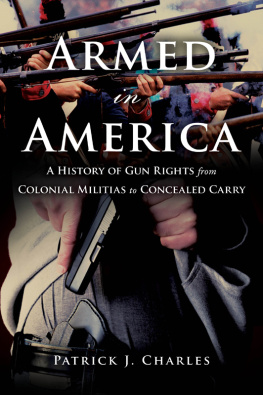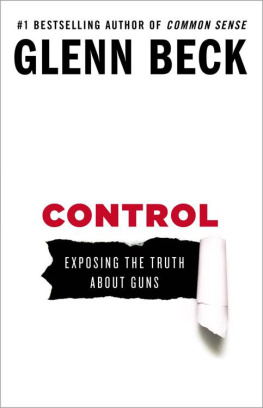

Published with assistance from the Louis Stern Memorial Fund.
Copyright 2015 by Firmin DeBrabander.
All rights reserved.
This book may not be reproduced, in whole or in part, including illustrations, in any form (beyond that copying permitted by Sections 107 and 108 of the U.S. Copyright Law and except by reviewers for the public press), without written permission from the publishers.
Yale University Press books may be purchased in quantity for educational, business, or promotional use. For information, please e-mail (U.K. office).
Set in Janson and Monotype Van Dijck types by IDS Infotech, Ltd.
Printed in the United States of America.
Library of Congress Control Number: 2015930849
ISBN 978-0-300-20893-1 (cloth : alk. paper)
A catalogue record for this book is available from the British Library.
This paper meets the requirements of ANSI/NISO Z39.481992 (Permanence of Paper).
10 9 8 7 6 5 4 3 2 1
Contents
Preface
This Time Is Different
We thought Sandy Hook would change things.
In December 2012, a lone gunman named Adam Lanza killed twenty first-graders and six adults at the Sandy Hook Elementary School with a Bushmaster semiautomatic rifle. Among those killed were the principal, Dawn Hochsprung, who confronted him as he shot his way into the building, the school psychologist, and four teachers. Of the many mass shootings that have scarred the nations consciousness in recent years, this one stood out as especially appalling.
Following the massacre, President Barack Obama made an emotional appeal for stronger gun control measures. I know this is not the first time this country has debated how to reduce gun violence, he said in his 2013 State of the Union address. But this time is different. Overwhelming majorities of AmericansAmericans who believe in the Second Amendmenthave come together around common-sense reform.
Yet the presidents allies in Congress failed. No changes were made to federal gun laws. Even the gun show loophole remained intact. To great fanfare, some states succeeded in making changes where the federal government failedNew York, Maryland, Colorado. One year after Sandy Hook, however, the country had loosened more gun regulations than it tightened. The New York Times reported that seventy gun-related measures enacted by statehouses in the year after the massacre expanded gun rights, and only thirty-nine imposed stricter controls.
This fits with a longer pattern of gun rights groups getting their way, despite the mass shootings that have punctuated our news cycle with alarming regularity. The routine response of the largest gun lobby, the National Rifle Association, to these shootings is that we need still more guns and gun-friendly laws. As a result, carrying a concealed gun is permitted in all fifty states, and carrying one openly in forty-four. The NRAs response to Sandy Hook was to claim we needed guns in every school in the nation, in the hands of armed guards or, barring that, teachers and staff. Several school systems have taken to doing just that.
Then there are the proliferating Stand Your Ground laws, enacted in thirty states as of this writing, where citizens
Despite the trend toward gun-friendly legislation, the American public is hardly at one with the gun rights movement and is uncomfortable with its current trajectory. The percentage of households with a gun has fallen since the 1970s.
What, then, explains the gun rights movements policy gains? When the gun control proposals following Sandy Hook failed in Congress, many wondered what kind of massacre might finally persuade the nation to insist on stronger gun control, and what was standing in the way.
The short answer is the NRA. The NRA, which channels the passion of gun rights advocates, is renowned for its political and financial clout, and its ability to strong-arm politicians. Many politicians are unwilling to take on the organization even when their constituents indicate they are not on board with the lobbys demands. Even President Obama, sensing the political winds, was silent on gun control through his first campaign and first term. He threw his weight against the NRA only when he was compelled to do so by the atrocity at Sandy Hook.
Yet there is also a more complicated answer. Our gun cultures roots go far deeper than just one well-connected organization. Our entertainment media are utterly awash in gun violencemaiming, massacres, serial killers. Countless video games, disparaged by cultural critics and the NRA alike, revel in gore and mayhem. Even though most of us do not see guns in our daily lives, they are a fixture of our cultural imagination. We are, furthermore, a warring nation. The United States has enjoyed few windows of peace since World War II. Our defense industry is the largest in the world and one of the engines of our economy. In the United States, we have been surrounded with violence, philosopher Judith Butler writes, having perpetrated it and perpetrating it still, having suffered it, living in fear of it, planning more of it, if not an open future of infinite war in the name of a war on terrorism.
Guns are engrained in our national identity and have a privileged place in the countrys founding narrative. The War for Independence was sparked by the Minutemen, ordinary gun-owning citizens, intent on securing their liberty. Their actions were sanctioned by the Founding Fathers, who inscribed the right to bear arms in the Constitution. For Thomas Jefferson and his contemporaries, the Second Amendment was deemed a critical measure for protecting democratic freedoms and the sovereignty of the people going forward. Even the iconic hero of our national expansionthe cowboyembodies the virtues of gun rights. He is independent and self-reliant, at least in theory; on the range, he metes out justice as a self-deputized agent of the law.
Perhaps it is our intimate relationship with gunsif not in our everyday lives, then in our cultural imagination and national identitythat inclines the voting public to delay action on gun control, or at least, not to object too strenuously to the positions of the gun rights movement.
But the fact remains: our gun culture is a poor fit for a twenty-first-century democracy. Most Americans sense this. They sense it when they drop their kids off to schools that increasingly resemble bunkers, with entry systems borrowed from prison technology. They sense it when they must fear whom they argue with, or irritateor whether they simply appear threateningon the streets of Florida where, thanks to Stand Your Ground, citizens can shoot to kill over minor disagreements. They sense it when they see gun-toting individuals at public protests, in diners and coffee shops, or at the grocery storesuch as when a man with a semi-automatic rifle slung over his shoulder entered a Kroger grocery store in Charlottesville, Virginia, in early 2013, and casually strolled the aisles. Frenzy ensued: shoppers poured out of the store. Our gun culture is an ill fit when we must live in fear of mass shootings in churches, shopping malls, and colleges.
His assessment was inspired by events in Colorado, which saw a recall in 2013 of two Democratic state senators who had supported the states tighter gun control legislation, passed in the wake of the shooting in a movie theater in Aurora, outside Denver, in which twelve were killed and seventy wounded. This recall was deemed a stinging loss for the gun control movement because it had poured so much money into the race, and because both state senators were recalled in districts that were majority Democrat, and replaced with Republicans. It was revealed afterward, however, that Democratic voters were not inspired to come out and save the day for their gun control champions; gun rights voters, on the other hand, came out in full force.
Next page
